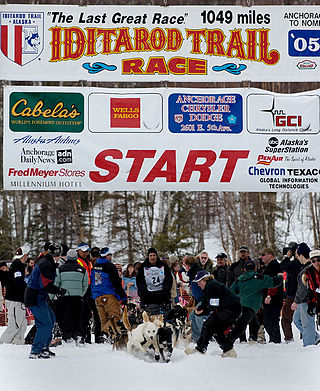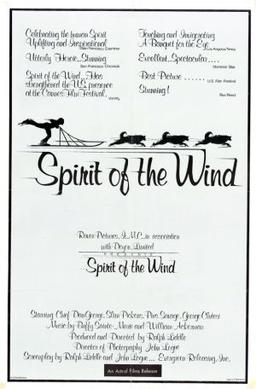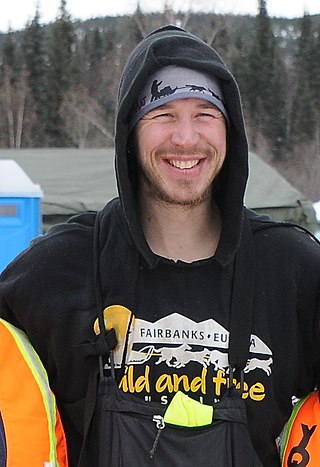
The Iditarod Trail Sled Dog Race, more commonly known as The Iditarod, is an annual long-distance sled dog race held in Alaska in early March. It travels from Anchorage to Nome. Mushers and a team of between 12 and 16 dogs, of which at least 5 must be on the towline at the finish line, cover the distance in 8–15 days or more. The Iditarod began in 1973 as an event to test the best sled dog mushers and teams but evolved into today's highly competitive race.

A sled dog is a dog trained and used to pull a land vehicle in harness, most commonly a sled over snow.

Susan Howlet Butcher was an American dog musher, noteworthy as the second woman to win the Iditarod Trail Sled Dog Race in 1986, the second four-time winner in 1990, and the first to win four out of five sequential years. She is commemorated in Alaska by the Susan Butcher Day.

The Yukon Quest, formally the Yukon Quest 1,000-mile International Sled Dog Race, is a sled dog race scheduled every February since 1984 between Fairbanks, Alaska, and Whitehorse, Yukon, switching directions each year. Because of the harsh winter conditions, difficult trail, and the limited support that competitors are allowed, it is considered the "most difficult sled dog race in the world", or even the "toughest race in the world"—"even tougher, more selective and less attention-seeking than the Iditarod Trail Sled Dog Race." The originator envisioned it as "a race so rugged that only purists would participate."

Jeff King is an American musher and sled dog racer. He is generally credited with introducing the sit-down sled which has largely replaced the standing sled traditionally used by distance mushers.

The ceremonial start of the 33rd annual Iditarod Trail Sled Dog Race across the US state of Alaska began in Anchorage on March 5, 2005, at 10 am AKST, and restarted in Willow the next day at 2 pm. After covering 1,161 miles (1,868 km) of wilderness, musher Robert Sørlie, an airport firefighter from Norway, crossed the finish line under the "burled arch" in Nome on March 16 at 8:39 am AKST. After taking care of his dogs, and an inspection to make sure all the mandatory equipment was in his sled, Sørlie was declared the winner by Race Marshal Mark Norman, with a time of 9 days, 18 hours, 39 minutes, and 31 seconds and won US$72,066.67 and a new truck. When asked how it felt to win a second time, Sørlie said "it feels good, I'm ready for breakfast." His team of dogs averaged 4.65 mi/h (7.58 km/h). The Red Lantern in last was Phil Morgan, an Alaska Airlines pilot, and when he crossed the finish line on March 21 at 8:02 pm AKST, the Widow's Lantern hanging on the burled arch was extinguished, which signaled the end of the race.

DeeDee Ann Jonrowe is an American kennel owner and dog musher who is a three-time runner up in the Iditarod Trail Sled Dog Race. She is a very popular figure in the sport, and her completion of the 1,049-mile+ race in 2003 just three weeks after completing chemotherapy for breast cancer received widespread publicity.
Emmitt Peters Sr. the "Yukon Fox", was an Alaskan American hunter, fisher, trapper, and dog musher. The last rookie to win the 1,049 mile Iditarod Trail Sled Dog Race, he and his lead dogs Nugget and Digger shattered the previous speed record by almost six days.
The ceremonial start of the 34th annual (XXXIV) Iditarod Trail Sled Dog Race across the U.S. state of Alaska began amidst the crowds of Anchorage on March 4, 2006, and the start of the competitive race, or "restart", began the next day in Willow. The race followed a modified version of the northern route for 1,151 mi (1,852 km) across the Alaska Range, through the sparsely inhabited Interior, along the Yukon River, and then up the coast of the Bering Sea to the city of Nome. Unlike in previous years, where the teams had to deal with unseasonably warm temperatures and soft, mushy snow, the weather was cold, with temperatures reported as low as −40 °F (−40 °C).

John Quniaq Baker is a self-employed American dog musher, pilot and motivational speaker of Inupiaq descent who once consistently placed in the top 10 during the long distance Iditarod Trail Sled Dog Race. Baker won the 2011 Iditarod with a finish time of 8 Days 19 Hours 46 Minutes 39 Seconds.

The ceremonial start of the 35th annual Iditarod Trail Sled Dog Race across the U.S. state of Alaska began amidst the crowds of Anchorage at 10 am (AKST) on March 3, 2007, and the start of the competitive race, or "restart", began at 2 pm the next day in Willow. The race followed the southern route for 1,151 mi (1,852 km) across the Alaska Range, through the sparsely inhabited Interior, along the Yukon River, and then up the coast of the Bering Sea to the city of Nome.

Lance Mackey was an American dog musher and dog sled racer from Fairbanks, Alaska. Mackey was a four-time winner of both the 1,000-mile (1,600 km) Yukon Quest and the Iditarod Trail Sled Dog Race.

Sebastian Schnuelle is a Canadian dog musher and dog sled racer from Whitehorse, Yukon, who won the 2009 1,000 mile Yukon Quest sled dog race. Schnuelle is fluent in English, French, and German. Nicknames: 'Sab' or 'the Armchair Musher'.
The Alpirod is a defunct 1,000 kilometres (621 mi) sled dog stage race in Southern Europe. Its name comes from a combination of the Alps, where the race took place, and the Iditarod Trail Sled Dog Race, upon which the race was based. The competition consisted of a 14-day stage race in 11 cities in four countries: Italy, Germany, Austria and France. The competition consisted of multiple short races separated by evening breaks, similar to cycling's Tour de France. At the time, it was the largest sled dog race outside North America. The race was organized by Armen Khatchikian, an Italian Iditarod competitor who hoped to bring a form of that race to Europe. It first took place in 1988, and the inaugural race was won by Alaska racer Joe Runyan. In 1989, the race was won by Kathy Swenson. She was the first woman to win the race. In 1990, Alaskan Roxy Wright Champaine won the race, becoming the third American winner. In 1992, the race was won by Nenana, Alaska musher Jacques Philip, who went on to win the race three times.

The Jamaica Dogsled Team is a team of sled dogs and mushers headquartered at Chukka Caribbean Adventures in Ocho Rios, located in Saint Ann Parish, Jamaica. The dog team is made up of strays rescued by the Jamaica Society for the Prevention of Cruelty to Animals and offers dryland dogsled rides, along with the adventure center's other outdoor experiences. In addition, the two mushers Newton Marshall and Damion Robb, compete in sled races throughout the US and Canada, using leased dog teams. Country music singer Jimmy Buffett's Margaritaville is the team's major sponsor.

Spirit of the Wind is a 1979 American Northern film directed by Ralph Liddle and starring Chief Dan George, Slim Pickens, Pius Savage, and George Clutesi.

Dallas Seavey is an American dog musher, and is the only musher to win the Iditarod Trail Sled Dog Race across the U.S. state of Alaska six times: in 2012, 2014, 2015, 2016, 2021, and 2024. In 2011, Seavey competed in and won the Yukon Quest sled dog race. In 2018 and 2019, Seavey also competed in Europe's longest sled dog race, Norway's Finnmarksløpet.

Aliy Zirkle is an American champion of sled dog racing.

Brent Sass is an American dog musher who is one of only six people to have won both the Iditarod and Yukon Quest sled dog races.
















